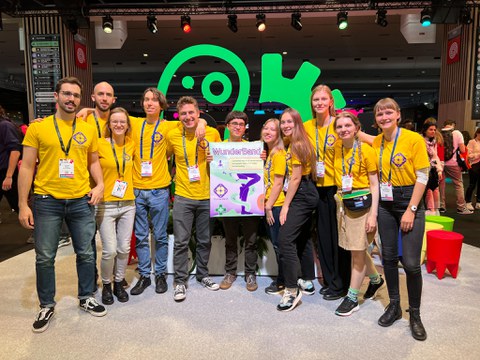Jan 05, 2023
Bringing Home the Gold: 2022 TU Dresden iGEM Team Successful at the World's Largest Synthetic Biology Competition

2022 TUD iGEM Team on the iGEM Grand Jamboree in Paris. From left to right: Giorgio Gilioli, Sebastian Eguiguren, Akvilė Gasiūnaitė, Adrian Zimmermann, Logan Poehlman, Tarek Benamar, Ekaterina Maximova, Railia Biktimirova, Palina Trus, Svetlana Iarovenko, and Meike Bremenkamp
An interdisciplinary team of students from TU Dresden has developed “WunderBand”, a bioresponsive hydrogel platform for the treatment of chronic wounds. Their modular system enables the tunable release of therapeutics in response to inflammatory factors and infections. Now, the 13 students have been awarded a gold medal at the iGEM Grand Jamboree in Paris. On top of this, they were among the top five teams in the therapeutics category, competing against 50 other teams from around the world.
Every year, the iGEM competition draws thousands of participants from around the globe. This year, more than 350 teams took on the challenge to apply the principles of synthetic biology to combat local problems, be it the environment or human health. Concerned with the medical needs of an aging population in Germany and Europe, the TU Dresden team sought to target chronic wounds with their WunderBand. The 13 team members come from six different countries - Italy, Belarus, the U.S., Lithuania, Russia, and Germany. Most of them study life sciences at the Center for Molecular and Cellular Bioengineering (CMCB) at TU Dresden, but some are students of computer science, media informatics, or even fine arts. "The interdisciplinarity of our team led to fruitful discussions during the meetings and in the lab and has proven valuable to achieve first results. We consider ourselves lucky to have the opportunity to get to know each other due to the excellent environment we are offered here at TU Dresden," the team writes on its homepage.
“The incidence of chronic wounds increases with age. With an aging society, this becomes more and more of a problem. Nevertheless, as of now, there is a shortage of effective treatments. This causes a large personal and societal burden. Another threat is the rise in antimicrobial resistance, whereby drug-resistant bacteria could easily infect such patients,” explains Giorgio Gilioli, leader of the iGEM TUD team and a Master’s student in the Regenerative Biology and Medicine program at the CMCB.
Given the multifaceted nature of the problem, the TU Dresden team devised an equally multifaceted approach. The core of the team’s idea was a modular hydrogel-based wound dressing that could incorporate a range of cargos for therapeutic release. The team would apply growth factors to the hydrogel to stimulate healing. To eliminate infections, the team turned to phages, the natural enemies of bacteria, and entrapped them inside the wound dressing. Moreover, the team managed to render the wound dressing bioresponsive using peptide linkers that crosslinked and stabilized the hydrogel.
"In chronic inflammation, the expression of proteases is increased, leading to extracellular matrix (ECM) degradation and wound exacerbation. These same proteases can also cleave peptide bonds, triggering degradation of the hydrogel and resulting in the release of entrapped factors and phages. The timing and dosage of treatment then depend on the severity of the wound itself," explains project supervisor Prof. Thorsten Mascher from the Faculty of Biology the working principle of the WunderBand.
Group leader Dr. Kai Ostermann is particularly impressed by the work of the iGEM team: "I was impressed by the extreme commitment of the students involved. They worked closely with the junior research group KoSyn in our lab, which was not only fun for both projects, but also involved extensive professional exchange and mutual inspiration."
In addition to the gold medal, the team was also nominated for three further awards: best therapeutics project, best composite genetic part, and best genetic parts collection. These highly competitive awards originate from the team’s multiple contributions to the iGEM genetic parts registry. Not only did the team show off their scientific achievements but also successfully represented the TU Dresden, the CMCB, the Faculty of Biology, and the Leibniz Institute for Polymer Research Dresden (IPF), as outstanding hubs for students and researchers.
"Without the support of the university, our supervisors Thorsten Mascher and Kai Ostermann, the Leibniz Institute of Polymer Research Dresden e. V., the program Funds for Student Research (FOSTER), and our sponsors, this success would not have been possible," the team emphasized in unison.
Team Members: Giorgio Gilioli, Akvilė Gasiūnaitė, Adrian Zimmermann, Logan Poehlman, Svetlana Iarovenko, Meike Bremenkamp, Tarek Benamar, Ekaterina Maximova, Eric Johne, Eric Schmidt, Palina Trus, Lea Hoffbauer, Railia Biktimirova
Instructors: Sebastian Eguiguren, Dr. Julia Döring, Dr. Lucas Schirmer, Tina Šubic
Supervising PIs: Prof. Thorsten Mascher, Dr. Kai Ostermann
To learn more about their bioresponsive design and synthetic biology work, visit the team’s website: https://2022.igem.wiki/tu-dresden/
About iGEM
The International Genetically Engineered Machine (iGEM) is an annual worldwide synthetic biology competition aimed at high school students, undergraduates, Master’s students, entrepreneurs, and community laboratories. Since its start in 2004, the competition developed into the largest and most prestigious student competition in the field of synthetic biology.
Contact
Thorsten Mascher
Professor of General Microbiology
TU Dresden
Email:
Tel. +49 351 463-40420
